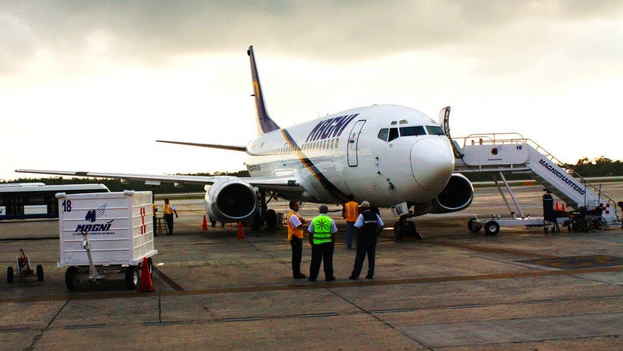
![]() 14ymedio, Natalia López Moya, Havana, 22 October 2022 – The tourist operator Bojórquez has sent a stern letter to the Cuban airport authorities, denouncing the misplacement of suitcases, removal of belongings from passengers’ luggage, and the substitution of waste matter for passengers’ property, in flights operated by the Mexican airline Magnicharters. The company considers these matters to be criminal and is even threatening legal action.
14ymedio, Natalia López Moya, Havana, 22 October 2022 – The tourist operator Bojórquez has sent a stern letter to the Cuban airport authorities, denouncing the misplacement of suitcases, removal of belongings from passengers’ luggage, and the substitution of waste matter for passengers’ property, in flights operated by the Mexican airline Magnicharters. The company considers these matters to be criminal and is even threatening legal action.
“Our airline takes seriously the care and protection of our passengers’ belongings”, warns the letter, dated 19 October, which has been seen by 14ymedio. “Every day we see an increase in this activity”, it emphasises, alluding to the interference with, and theft from, luggage. The letter, signed by Armando Bojórquez Patrón, president of the tourist operator Bojórquez, details some of the troubling discoveries they have made.
“Misplaced suitcases, suitcases broken, opened, with damaged locks (padlocks, cable ties), removal of contents, substitution of contents with other items in order to keep the baggage weight the same, broken items left inside cases, empty perfume bottles, used and soiled items of clothing”, explains Bojórquez.
The letter, sent to Cuban Airports and Airport Services and the authorities at José Martí International Airport Terminal 3, explains that the airline “backed the Cuban destination, under the conditions of the travel agents charter”. This season, in addition to carrying passengers between Cancún, Mexico City, Mérida and Havana, as well as on the new route of Cancún- Holguín, the company is transferring Cuban migrants who have been deported from Mexico.
“That is to say, in an active way it is maintaining its services to Cuba not only in a tourist capacity but in a governmental one”, Bojórquez emphasises. The company operates these routes with a fleet of Boeing 777’s, each with capacity for 136 passengers. Although Magnicharters “takes seriously the care and protection” of its passengers’ belongings, “it is becoming impossible” to maintain its standards on its routes to the island.
The airline, which flies mainly to Mexican beach destinations, had 12 aircraft in 2016, but with the arrival of the pandemic it was forced to keep a number of them grounded. There is a hold-baggage limit of 25kg plus 20kg hand luggage on the Cancún-Havana route, which makes the company a perfect choice for Cuban ’mules’.
The ticket price of 278 dollars makes the route between the Cuban capital and the Mexican resort an attractive proposition for those importing goods for resale on the black market in Cuba. “They are flights loaded with purchases — white goods, clothes, footwear and other products — carried for later profitable sale at the highest price”, admits an employee of the General Customs Service who works at terminal 3 of Havana airport.
Bojórquez’s letter demands that the Cubans do more to protect luggage: “It’s our intention to ensure that all parties are able to activate the mechanisms for security and protection to which we are duty-bound, in the handling of passengers’ luggage, and that we don’t lose, through being lax, the prestige that we have all earned in our daily operations”.
Last April, Magnicharters cancelled their flights between Havana and Managua, Nicaragua, a route which had been particularly profitable given that each ticket sold for over 3,000 dollars. This cancellation came in shortly after conversations about migration had been held between the Cuban and Mexican governments, in which they pledged to maintain an “ordered and secure” migration.
The letter ends by calling for the “minimisation of these unfortunate incidents” and the company offers its “collaboration in avoiding these occurrences, already happening repeatedly on Magnicharters’ flights” to Cuba. The document has already had an impact in the baggage section at José Martí airport, where management are looking to evade responsibility and are seeking out the culprits.
This very week several tour operators arrived in Havana on Magnicharters flights, at the invitation of the Cuban tourist authorities. “When they arrived at their hotel they noticed that their luggage had been partly interfered with and stolen from”, an airport source told this newspaper, who blamed the incidents on the Mexicans themselves. “They seem to have occurred back there at the airport of departure, but we haven’t been able to verify that yet”.
However, other employees consider that what is happening fits with a “type of theft which is unique to Cuban airports where the workers are paid a very low salary and are put in daily contact with luggage containing belongings that are worth more than a whole month’s wage”, a worker connected to the main Cuban airport terminal told 14ymedio.
There are frequent complaints of luggage theft at Cuban airports and among victims’ testimonies are repeated accounts of broken locks, removal of items such as clothing, shoes, perfumes etc, as well as substitution of these items with old clothing, newspaper and even stones.
Translated by Ricardo Recluso
____________
COLLABORATE WITH OUR WORK: The 14ymedio team is committed to practicing serious journalism that reflects Cuba’s reality in all its depth. Thank you for joining us on this long journey. We invite you to continue supporting us by becoming a member of 14ymedio now. Together we can continue transforming journalism in Cuba.
